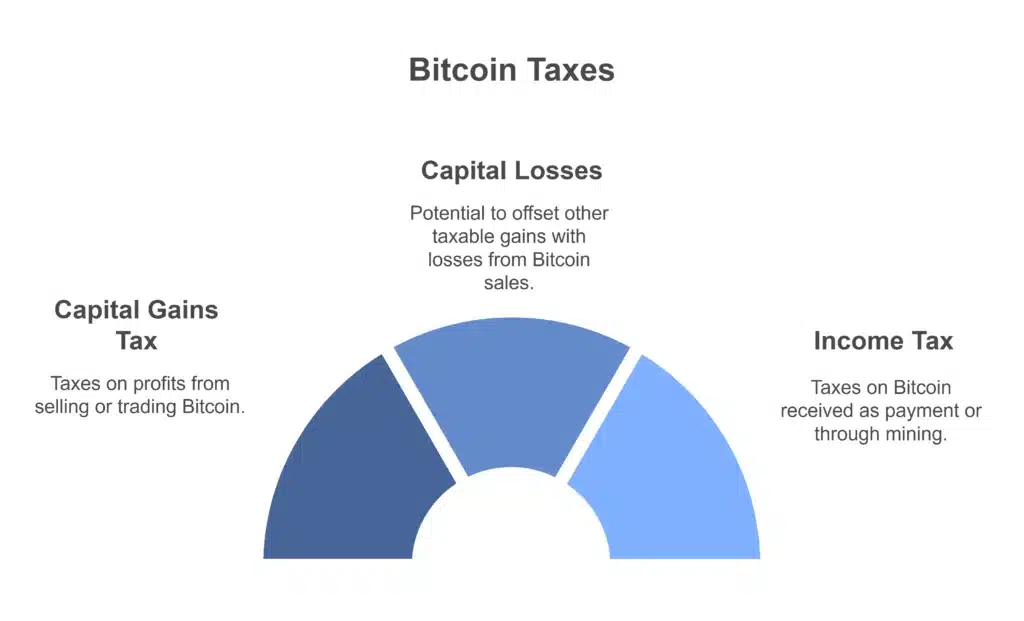Cryptocurrency is fast-growing a trendy investment option for most. With these gains in popularity, however, comes an essential responsibility — bitcoin taxes. If you’ve sold, bought or traded crypto, you’ll want to know what the tax implications are. There are established regulations in the Internal Revenue Service on how cryptos are taxed, and tax compliances could save you from the pedal to end up in potential penalties.
This article explains how to report and pay taxes on Bitcoin, Ether and other crypto in the US, so that you can be informed and confident throughout tax season.
What Are Bitcoin Taxes and Why Do They Matter?
Before we get into the how’s of Bitcoin taxes, it’s essential to understand the basics. The IRS classifies Bitcoin and other cryptocurrencies as property, not currency. Any transaction involving crypto—for example, selling Bitcoin for USD or exchanging Bitcoin for Ethereum—is taxable.
Here’s what that means for you:
- Capital Gains Tax: If you profit from selling or trading Bitcoin, you owe taxes on the gain.
- Capital Losses: If you sell at a loss, you might be able to use that loss to offset other taxable gains.
- Income Tax: Receiving Bitcoin as payment or through mining? These will be taxed as ordinary income.
The key takeaway? The IRS treats crypto just like stocks or real estate for tax purposes. You’ll need to track and report all your transactions to stay compliant.

Do You Need to Pay Taxes on Your Bitcoin?
Not all crypto transactions are taxable, but many are. Here’s a quick rundown of when you’ll need to think about taxes:
Taxable Events
- Selling cryptocurrency for cash (e.g., selling Bitcoin for USD).
- Exchanging one crypto for another (e.g., trading Bitcoin for Ethereum).
- Using crypto to purchase goods or services (e.g., paying for coffee with Bitcoin).
- Earning cryptocurrency through mining, staking, or as payment for services.
Non-Taxable Events
- Buying cryptocurrency with cash (e.g., purchasing Bitcoin with USD).
- Holding cryptocurrency (e.g., simply keeping Bitcoin in your wallet).
- Transferring crypto between your own wallets.
You’ll need to calculate your gains or losses for each transaction if you’ve done any taxable activities.
How Is Bitcoin Taxed in the US?
Capital Gains Tax
When you sell or trade Bitcoin, you profit or incur a loss. The IRS wants a share of the profits, taxed as capital gains. The tax rates vary based on how long you hold the asset before selling:
- Short-Term Capital Gains (Held for one year or less): Taxed at your ordinary income tax rate.
- Long-Term Capital Gains (Held for over a year): Taxed at a lower rate—0%, 15%, or 20%—depending on your taxable income.
Income Tax
If you receive Bitcoin as payment for work, mined it, or earned it through staking rewards, it’s treated as income. The fair market value of the crypto at the time you receive it will be subject to income tax.
How to Report Your Bitcoin Taxes
Now that you understand if and how your crypto is taxed, it’s time to learn how to report it. Here’s a step-by-step breakdown:
Keep Accurate Records
Tracking your crypto transactions is critical. You’ll need records of:
- The date and time of each transaction.
- The amount of cryptocurrency involved.
- The fair market value at the time of the transaction (in USD).
- Any costs associated with the transaction (e.g., transaction fees).
Many use crypto tax software to simplify this. Tools like CoinTracker or Koinly can automatically sync with exchanges to track your transactions and calculate gains or losses.
Calculate Your Gains and Losses
For every taxable event, you’ll need to determine the difference between the asset’s purchase price (cost basis) and its selling price (fair market value):
- Profit = Selling Price – Purchase Price
- Loss = Purchase Price – Selling Price
Organize these by short-term and long-term gains, as they’re taxed differently.
Fill Out IRS Forms
To report your crypto activity, you’ll need these IRS forms:
- Form 8949: Details each crypto transaction, showing your gains or losses.
- Schedule D (Filed with Form 1040): Summarize your total gains or losses.
- Schedule 1 (For income from mining or staking): Report it as “Other Income.”
Submit Your Taxes
Include your gains, losses, and income in your annual tax return along with the forms mentioned above. Use tax software like TurboTax or consult a tax professional specializing in cryptocurrency to ensure accuracy.
Avoiding Common Bitcoin Tax Mistakes
Missteps with Bitcoin taxes can lead to stressful audits or penalties. Avoid these common mistakes:
- Neglecting to Report Transactions: Even small trades or use of Bitcoin for purchases are taxable events.
- Miscalculating Cost Basis: If you lose track of what you originally paid for Bitcoin, you might over- or underpay taxes.
- Failing to Report Mining or Staking Income: If you earned cryptocurrency, it must be included in your taxable income.
- Not Using Crypto Tax Software: Tracking crypto transactions manually can lead to errors.
Stay proactive and organized throughout the year to make tax season less daunting.
Staying Compliant with IRS Crypto Guidelines
The IRS is cracking down on crypto tax compliance. Starting in 2020, taxpayers were required to answer “Yes” or “No” to whether they engaged in any virtual currency transactions on Form 1040. Answering dishonestly can have serious consequences.
To stay safe:
- Keep detailed records of all crypto activity.
- Use tax software or hire a professional to avoid mistakes.
- If unsure, consult the IRS Crypto Guidelines for clarification.
Leveraging Crypto Tax Software
Tools like CoinTracker, Koinly, and CryptoTrader.Tax simplifies the process of calculating and reporting Bitcoin taxes. They automatically import your transaction history, calculate gains/losses, and generate the necessary IRS forms.
These platforms are beneficial if you have transactions across multiple wallets or exchanges.
Final Thoughts on Bitcoin Taxes
While paying tax on Bitcoin can seem challenging to say the least, it is entirely possible with the right tools and knowledge. Begin by maintaining accurate records of all your transactions and knowing which events are taxable. For long-term holders, trading and everything in between, being compliant is key.
If you’re feeling out of your depth, be sure to speak to a tax pro or use crypto tax software to make your reporting easier. Keep in mind — the IRS is watching, but you can file Bitcoin taxes with confidence if you take the time to prepare.


